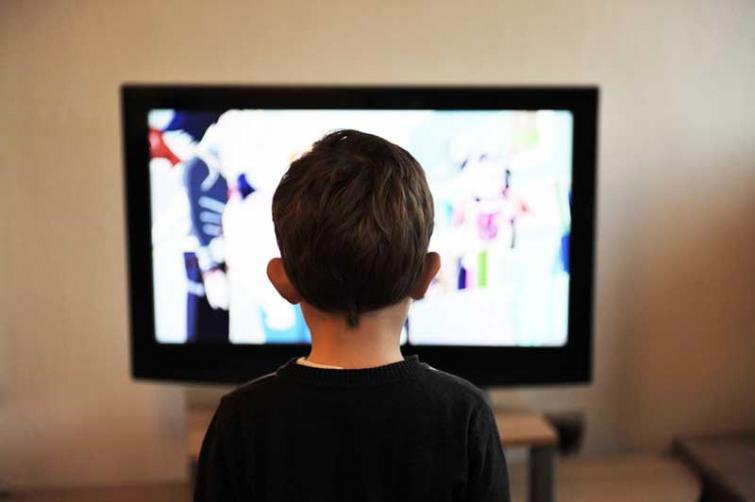
Preschoolers who watch TV sleep less, study finds
Amherst, May 18 (IBNS): Preschoolers who watch TV sleep significantly less than those who don’t, according to new research by University of Massachusetts Amherst neuroscientist Rebecca Spencer and developmental science graduate student Abigail Helm.
More surprising to Spencer, known for her groundbreaking research into the role of naps in children’s memory and learning, 36 percent of 3- to 5-year-olds had TVs in their bedroom, and a third of those kids fell asleep with the TV on, often watching stimulating or violent adult programming.
The study, published in “Sleep Health,” the journal of the National Sleep Foundation, suggests that TV use by young children affects the quality and duration of sleep, measured for the first time by an actigraphic device kids wore like a watch on their wrist. Moreover, while daytime napping was found to increase among the kids who watched the most TV, it did not fully compensate for the lost sleep at night.
“The good news is, this is addressable,” says Spencer, referring to the opportunity to educate parents about the new, myth-shattering evidence that TV does not help young children fall asleep. “Parents assumed that TV was helping their kids wind down. But it didn’t work. Those kids weren’t getting good sleep, and it wasn’t helping them fall asleep better. It’s good to have this data.”
The findings of Spencer and Helm come on the heels of new guidelines from the World Health Organization (WHO), which say children between age 2 and 4 years should have no more than one hour of “sedentary screen time” daily – and less or no screen time is even better. Similarly, the American Academy of Pediatrics suggests that daily screen time for 2- to 5-year-olds be limited to one hour of “high-quality programs,” and that parents should watch the programs with their children. The WHO also emphasized the importance of young children getting “better quality” sleep for their long-term health.
Some 54 percent of kids in the UMass Amherst study are not meeting the WHO’s TV-viewing guidelines on weekdays, and the figure jumps to 87 percent on weekends, Spencer says.
In addition to a dearth of data on TV viewing and sleep among this age group, previous research that does exist has relied on parent-reported measures of sleep, and “parents tend to overestimate sleep duration,” according to the study. “One of the biggest advantages we have in our approach is the use of these actigraphs,” which have been found to provide a reliable measure of sleep, Spencer says.
The new research piggybacked on Spencer’s larger study about young children’s sleep and cognition, supported by a National Institutes of Health grant. “Given that we already have some data about why sleep and naps are important for young kids, we decided to look into what are the factors that determine when they sleep, how they sleep and why they sleep,” Spencer says.
A “very diverse” group of 470 preschoolers from Western Massachusetts participated in the study, wearing actigraphs for up to 16 days. Their parents and caregivers answered questionnaires about demographics and the children’s health and behavior, including detailed questions on TV use. Among the findings:
Preschoolers who watch less than one hour of TV per day get 22 more minutes of sleep at night – or nearly 2.5 hours per week – than those who watch more than an hour of TV daily.
On average, young children without TVs in their bedrooms slept 30 minutes more at night than those with a TV in their bedroom.
Although kids with TVs in their bedroom slept on average 12 minutes longer during naps, they still slept 17 minutes less during a 24-hour period than kids without TVs in their bedroom.
Spencer says she plans to expand future child sleep studies to examine the impact of hand-held digital devices, such as iPads and smartphones. She also points out that TV use by kids as reported by their parents is likely to be underestimated.
“I think TV is its own beast to understand,” she says.
Support Our Journalism
We cannot do without you.. your contribution supports unbiased journalism
IBNS is not driven by any ism- not wokeism, not racism, not skewed secularism, not hyper right-wing or left liberal ideals, nor by any hardline religious beliefs or hyper nationalism. We want to serve you good old objective news, as they are. We do not judge or preach. We let people decide for themselves. We only try to present factual and well-sourced news.







